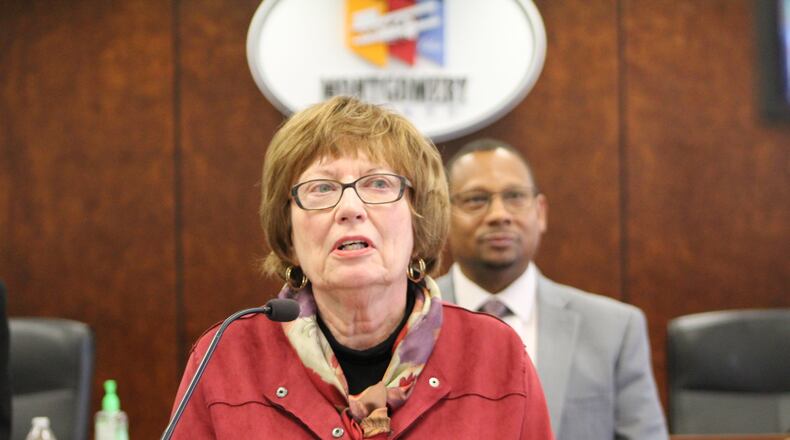“It’s not like we can stop providing these services, especially when people are going to be sick,” said Dayton Mayor Nan Whaley. “We’re going to need help from the state and federal government, so we are aggressively pursuing that every day.”
Dayton expects to lose millions of dollars in income tax revenue, and other local governments are worried about large decreases in collections.
“It’s scary times,” said Montgomery County Commission President Judy Dodge. “We are going to the feds and the state, because we have to — we’re not going to put it on our citizens.”
MORE: Coronavirus crisis sparks 2,500% increase in Ohio unemployment claims
Income taxes account for about three-fourths of Dayton’s general fund budget, and city leaders predict collections to decline sharply because many employers have cut workers or their hours after being forced to shut down or scale back.
The city collected about $133.6 million in income tax revenue in 2019, including about $11.25 million in March and $15.4 million in April, which was the highest tally of the year.
Dayton, a regional job center and the largest city in the area, must continue providing services citizens depend on during this crisis, like police, fire and EMS and trash, Whaley said.
But the city needs to pay for those services with limited resources, and there’s no way to know at this point how much damage coronavirus will do to the economy and government coffers, Whaley said.
But, she said, there will be millions of dollars in losses.
“It’s going to be bad,” she said. “We’re modeling — we don’t know how hard we’re going to be hit, we don’t know how long the orders will last, and those are all things we’re worried about.”
Like the city of Dayton, Montgomery County declared a state of emergency in large part in the hopes of receiving state and federal funding relief related to the outbreak.
The county estimated that it would collect about $101.3 million in sales taxes this year, accounting for about 56% of general fund income.
The county originally expected sales taxes to increase by more than 2.8%, but collections could tumble since businesses have been ordered to close and consumers increasingly are sheltering in place.
MORE: Montgomery, Greene counties declare emergency; Warren votes no
The county does not have the resources to cover the cost and impact of a long-term pandemic, said Montgomery County Administrator Michael Colbert.
Colbert said he hopes the federal and state governments will work together to provide local jurisdictions with assistance, possibly using some of the state reserves.
He said the county may have to make budget adjustments, depending on revenues.
“Local governments are going to take a big hit here,” he said.
Greene County, which also declared a state of emergency, receives about $28 million annually from sales taxes, which make up more than half of its general fund revenue.
A large portion of the county revenue also comes from investments, casino funds and the local government fund, said Brandon Huddleson, county administrator.
“We expect all of those sources to be drastically reduced over the next few months,” he said.
But Huddleson said Greene County is in a strong financial position because of higher revenues and careful spending in recent years.
MORE: Dayton airport passenger traffic plummets because of coronavirus
He said commissioners deliberately set money aside for emergencies like this.
Other local cities say they are trying to prepare for budget hits because of the outbreak.
"Given the recent business closings announced by the state, we anticipate that this will have an impact on our income tax collection revenue," said Lebanon City Manager Scott Brunka. "As the situation continues to develop, we will evaluate if any mid-year budgetary adjustments may be necessary as a result of this."
This week, the U.S. Conference of Mayors requested that Congress provide $250 billion in assistance to help cities provide services, protect their economies and stop the spread of the virus, according to Mayor Whaley, who is a second vice-president of the organization.
She said the federal government could use the existing Community Development Block Grant formula to distribute money quickly to cities.
Whaley also wants the state to greatly increase local government fund distributions by tapping its Rainy Day Fund, which last year nearly had $2.7 billion.
“We have to find other sources of income,” she said.
The hospitality sector has mostly shut down, and if other parts of the economy do the same and the shutdown lasts months, cities’ income tax collections are going to fall off a cliff, officials say.
“I believe is is going to be deep and expansive,” said Dayton City Manager Shelley Dickstein. “Bailing out from COVID-19 will be extraordinary — there has been global disruption in the economy.”
The city is paying close attention to its finances, doing weekly financial modeling and has implemented a hiring freeze and suspended or cut contract and materials expenses, she said.
The city will have to continue to make “expenditure corrections” and does not want to spend down its cash reserves, , she said.
The city maintains about 15% of its annual general fund operating budget in reserves, which is about 56 days of general fund operations, according to a city audit summary.
Counties that receive sales taxes initially could see a boost in collections, since many people went on spending sprees to stockpile goods and prepare to hunker down, said Kevin Willardsen, assistant professor of economics at Wright State University.
The “front-loaded” spending will end, and after that likely there would be sizable drop-offs in sales the following months, Willardsen said.
“Right now, what people are doing is ‘consumption smoothing’ — they are buying a bunch of stuff now and will consume it over a period of time,” he said.
The longer this crisis lasts, the worse it will get, because consumers won’t be shifting spending from one month to another, but instead will reduce consumption, he said.
About the Author

